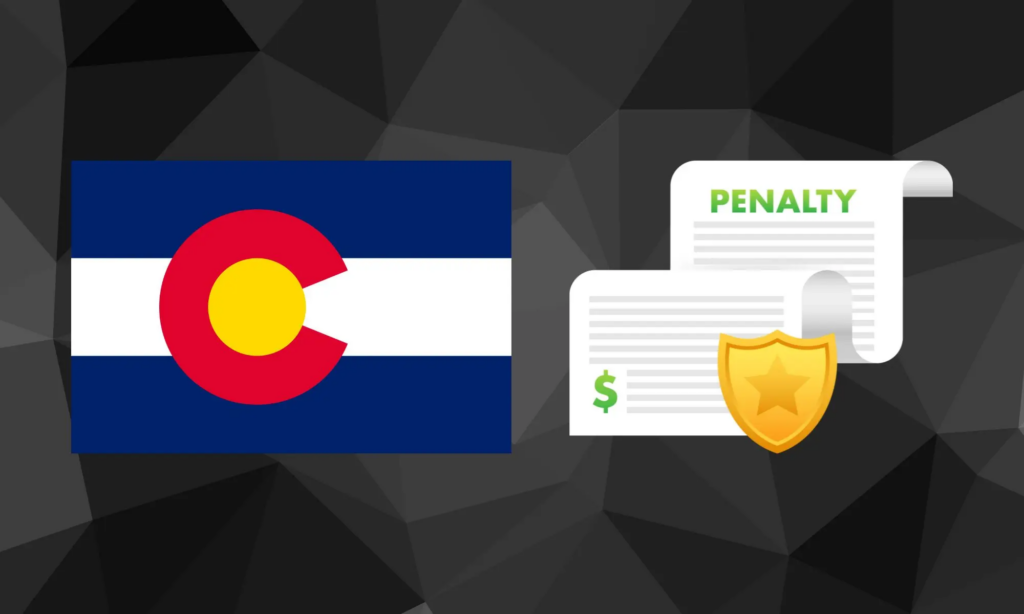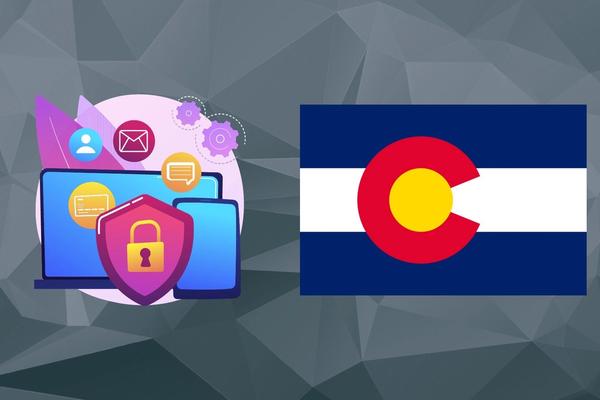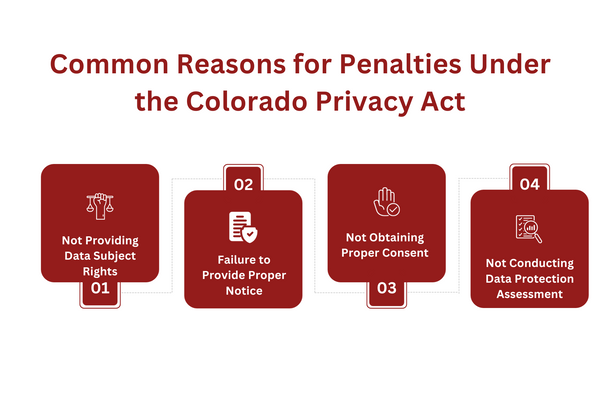
Imagine living in a world where every click, purchase or online activity you make is recorded without your consent. As unnerving as it seems, this has become an all-too-common practice across the globe.
However, the Colorado Privacy Act promises to tighten these loose trends of personal data invasion with Colorado Privacy penalties.
This piece guides you to understanding what’s at stake with the Colorado Privacy Act (CPA).
We’ll dive into the nitty-gritty of penalties so you can keep your business safe and sound. From what triggers a penalty to how to avoid them, we’ve got you covered.
Let’s dive right in.
Key Takeaways
Colorado passed a new privacy law recently, and that’s no joke. Businesses need to be really careful with people’s personal data, or the Colorado government can slap them with fines of up to $20,000 per violation.
You’ve got until 2025 to use the Cure Period and become compliant with the CPA. Don’t wait until the last minute!
Some businesses are off the hook for the most part. Really, small businesses or businesses following other privacy laws might not need to do anything differently because of the CPA.
What is the Colorado Privacy Act?
What is the Colorado Privacy Act (1).jpg

The Colorado Privacy Act is a new law for how businesses should handle personal data. This law is for medium to large-sized businesses that collect personal details from residents in Colorado. This law helps to give Colorado residents more power over their own data.
On July 1, 2023, the Colorado Privacy Act kicked into gear. The point is to keep businesses that collect people’s personal data in check and make sure they’re being fair about how they use it. Kind of like an overseer for consumer data?
This law applies to businesses that deal with more than 100,000 people’s personal data in a year or make over 25% of their money selling more than 25,000 people’s data.
Why did they make this law? Well, people were getting worried about how their personal data were being used. They wanted more control. The Colorado Privacy Act is here to say, “we hear you,” and to make sure businesses treat personal data with the privacy it deserves.
The bottom line is that the Colorado Privacy Act is about showing personal information the privacy and protection it deserves. It’s supposed to make businesses be upfront about what they do with people’s data and give people a say in it.
Colorado Privacy Act Penalties
Colorado Privacy Act Penalties.jpg

The new Colorado Privacy Act says businesses must follow the law, or they’ll face serious fines, especially if there’s a Colorado Privacy Act breach.
If the Colorado AG’s office decides a business broke the law, especially in the event of a data breach, they can slap them with a $2,000 to $20,000 fine (depending on the severity) for each violation and each consumer impacted.
So, if a business messes up for a bunch of people, those fines will add up really quickly. But there’s a limit on how bad they can ding a business.
Even if a business violates the law thousands of times and hits a load of consumers, the maximum penalty in terms of a fine is $500,000. That’s the cap no matter what, and it’s a chunk of change meant to get businesses to take the privacy law seriously. Don’t wanna get fined? Follow the rules.
Additional Penalties
Not following the rules in the CPA can hurt your business in more ways than just a fine. It could make consumers not trust you anymore. People care about their privacy these days, so if you break that trust, it’s bad news. Plus, you might have to pay a lawyer if you get sued, and the court could make you pay back consumers you hurt.
Lawsuits take time and money that you should spend on growing your business. Really, the whole cost of ignoring the CPA isn’t just the fine, it can wreck your reputation, cost you money, and even put you out of business if you aren’t careful.
On top of that, the CPA can also enforce criminal charges on you or your business, depending on the severity of the violation.
Staying compliant isn’t just about dodging fines – it’s about respecting your consumers and ensuring your business’s longevity through corporate compliance.
What is the Cure Period for the Colorado Privacy Act?
The Colorado Privacy Act gives businesses a kind of second chance called a “cure period.” This is a 60-day period a business gets to fix a mistake before any fines are enforced. It’s like a grace period. This period is only temporary, though.
The cure period is there to give you a fair shot at setting things right. Why did they make this cure, period? Well, the folks who wrote the CPA know that data protection can be tricky, and new rules take time to get used to.
They wanted to give businesses time to learn the rules first. It’s about being fair and giving a helping hand to businesses working hard to follow the new rules.
But don’t get too comfy. This cure period won’t last forever. It’s set to end on January 1, 2025. After that, if your business isn’t in line with the CPA, you could face fines right away without any Cure Period to help you. So, think of the cure period as your business’s learning time.
Remember, the cure period is not just a break; it’s a chance to really understand and put into action the principles of the CPA. It’s about building trust with your consumers by showing them their personal data is safe with you. And that’s something that will still matter long after the cure period is over.
Organizations Exempt from the Colorado Privacy Act
Not every business needs to worry about the Colorado Privacy Act (CPA). Some small fries can swim right on by. The CPA is like a big fishing net meant to catch the whales in the data ocean. But smaller fish can slip through the holes.
So, who gets to keep swimming freely? Small businesses, for one, and if your business doesn’t deal with more than 100,000 people’s personal info in a year or make over 25% of your money selling more than 25,000 people’s data, you’re off the hook.
The CPA understands that smaller businesses might not have the resources like the big businesses do, so it goes easier for them.
Then, there are businesses already covered by other laws. If your business handles health records, you likely follow HIPAA. Or if you’re a bank or handle money, you probably keep up with GLBA. If that’s you, the CPA says you’re already doing your part, and you’re exempt.
Also, if you’re in the world of planes, the FAA has rules for you. And if you report to the SEC, you’ve got enough red tape to deal with there.
Common Reasons for Penalties Under the Colorado Privacy Act
Common Reasons for Penalties Under the Colorado Privacy Act.png

When it comes to the Colorado Privacy Act, businesses make some common mistakes that cost them. It’s like playing soccer – make certain fouls, and you’ll get a yellow or red card, and knowing these fouls can help you play by the rules and avoid fines.
Not Providing Data Subject Rights
Upholding data subject rights is a core aim of the CPA. Businesses must empower consumers to access, correct, or erase their personal data to avoid penalties.
To avoid this, make sure your business has a clear way for people to ask about their data and that you respond quickly.
Failure to Provide Proper Notice
You’ve got to tell people what you’re doing with their data through a privacy notice. If you’re not transparent about how you use personal info, you could get penalized. Be clear – have an easy-to-find and understand privacy notice.
Collecting Sensitive Data Without Obtaining Proper Consent
Sensitive information like ethnicity data or social security numbers requires a clear yes from people before you collect it. Avoid issues by getting consent upfront with a simple form explaining what you’re collecting and why.
Not Conducting Data Protection Assessment
Not doing a data protection assessment is risky. Regular checks help you spot and fix problems in how you handle personal data. Take the time to self-audit so you don’t get called for a foul.
It is also legally required to conduct a data protection assessment before engaging in high-risk activities.
The CPA has strict rules, but following them helps build trust. Take the time to understand requirements and operate openly. That’ll keep your business penalty-free so you can focus on your goals.
Closing
You’ve learned a ton about this new Colorado Privacy Act and what it’ll mean for your business. Now, it’s time to put that knowledge into action. Maybe you’re thinking about what to do next or how to make sure you’re on the right track. That’s where we come in.
Fortunately, at Captain Compliance, providing compliance services to guide businesses like yours through privacy laws is what we excel at. We can offer outsourced compliance services to demystify the CPA rules for you, assisting you in managing your data with proper compliance.
Our services range from drafting transparent privacy notices to obtaining proper consent and from conducting thorough data protection assessments to providing comprehensive compliance training – we’ve got all your needs covered.
Get in touch with our team, and we’ll make sure you’re not just avoiding penalties but also building real trust with every single consumer. When it comes to data privacy, being on the good side of the law is always good for business.
FAQs
What counts as personal data under the Colorado Privacy Act?
Personal data is any data that can identify a person, like a name, address, or email. It’s the kind of stuff you wouldn’t want strangers to know without your okay.
Learn what you can do to protect your personal information in our guide here.
How can my business comply with the Colorado Privacy Act?
To comply, understand what data you have, respect consumer rights, be clear about your privacy practices, and keep data safe.
Feeling overwhelmed? Get in touch with us for a step-by-step guide to CPA compliance.
What if my business is too small for the Colorado Privacy Act?
If you handle data for less than 100,000 people and don’t earn much from selling data, your business is not covered by the CPA, and you will not have to follow it. However, you may need to follow other regulations like the GDPR, which have similar rules.
Wondering if you’re exempt? Check our education section for more details!
What are the steps to take after identifying a Colorado Privacy Act breach?
If you spot a breach, you need to figure out the damage quickly, tell the people whose data was affected, and report it if needed. Then, make sure you fix any security holes to stop it from happening again.